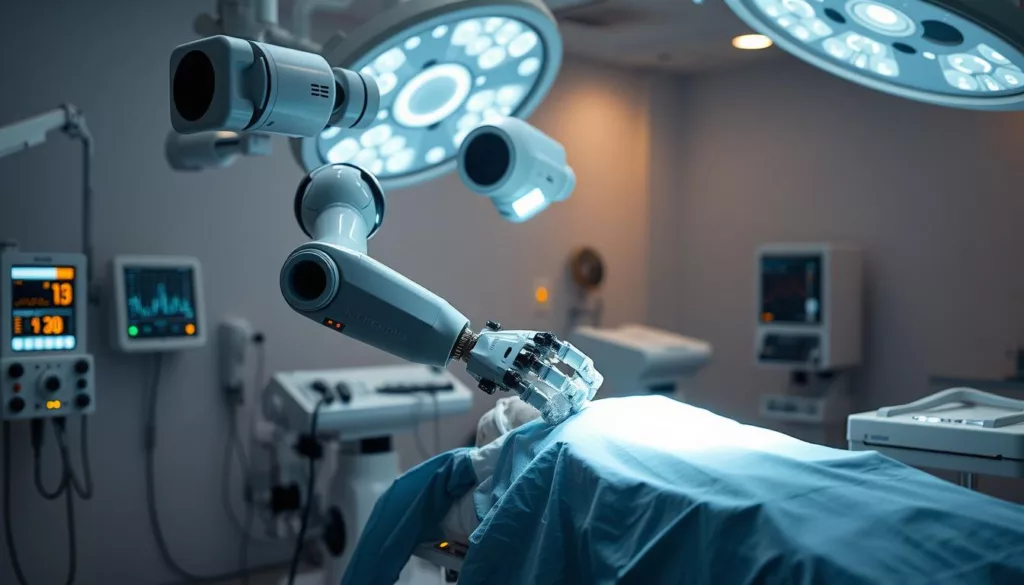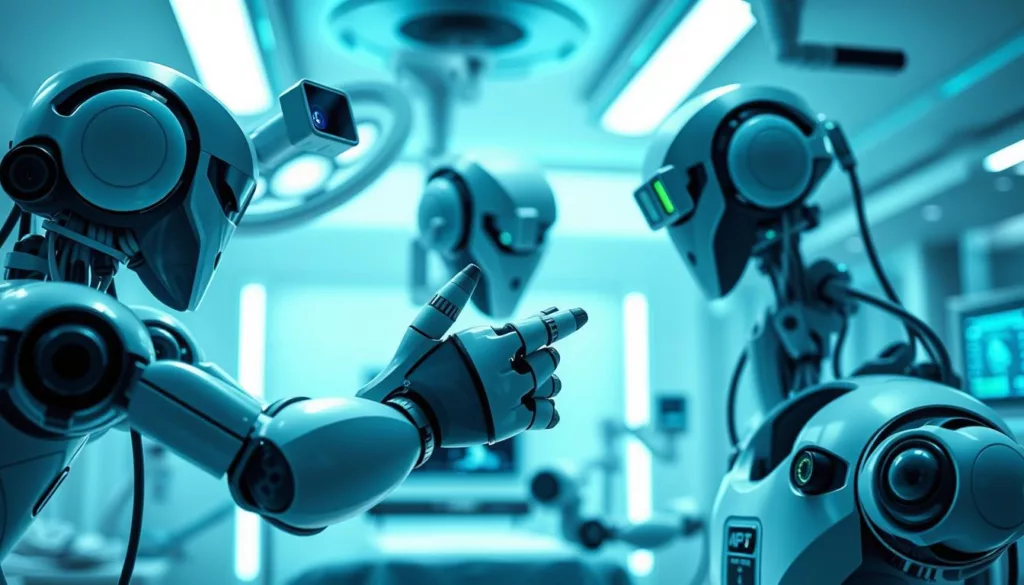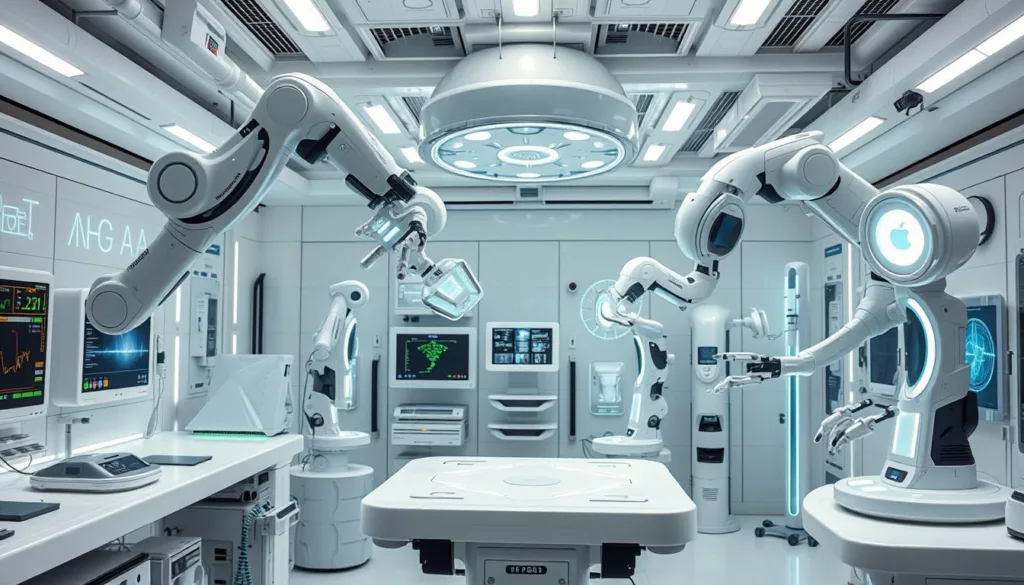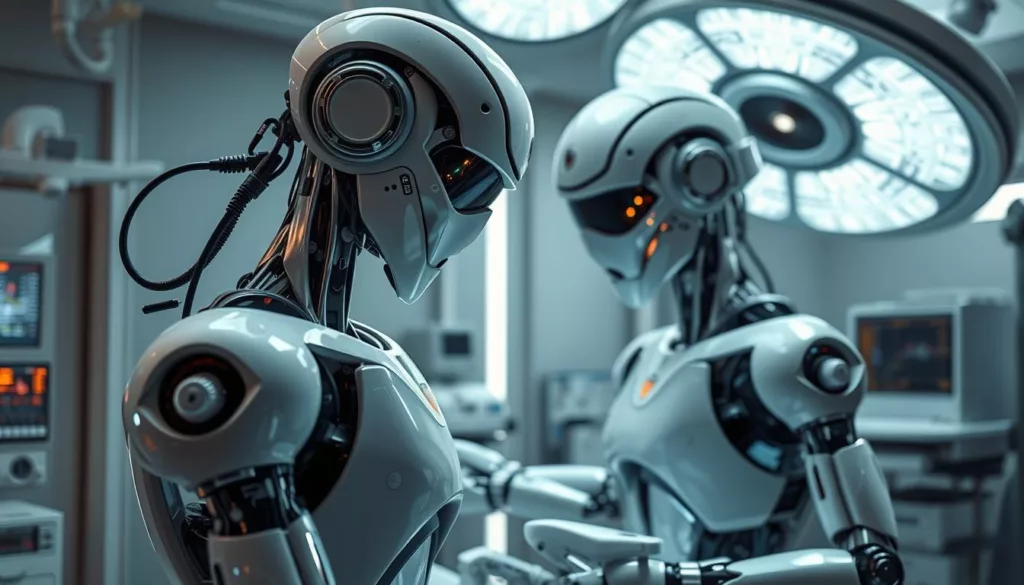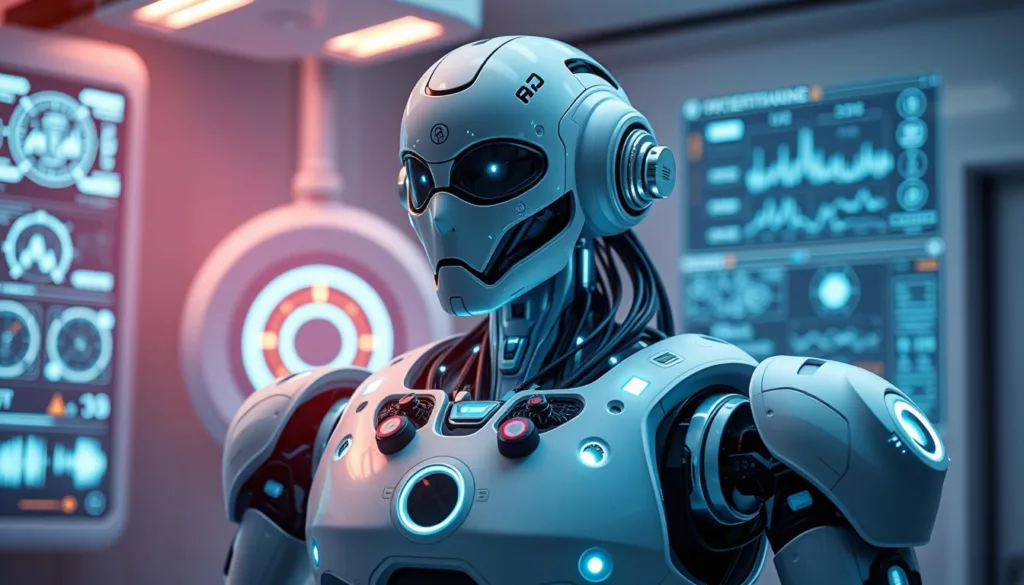Sensors are now key in healthcare, helping to improve surgery and patient care. Our guide looks at the top sensors for healthcare and surgical robots. It shows how medical robotics sensors boost precision and safety in surgeries.
We cover various sensors, their uses, and new developments. These advancements are changing how surgeries are done in operating rooms and more.
Key Takeaways
- Sensors are vital for better precision and safety in surgical robots.
- Knowing about medical robotics sensors can lead to better surgery results.
- New sensor tech is changing healthcare practices.
- Different sensors have unique roles in medical settings.
- Picking the right sensors from top brands is important for healthcare.
- Sensor technology is always getting better, shaping the future of surgery.
Introduction to Sensors in Healthcare Robotics
Sensors are key in healthcare robotics. They help with everything from diagnosing to complex surgeries. They gather data in real-time, which is important for checking how well robots work.
These sensors track things like pressure, temperature, and movement. This helps robots work better and make smarter choices.
These sensors are a big part of healthcare robot systems. They let robots really connect with their surroundings. As we look closer, we’ll see how these systems help patients get better care.
The Role of Sensors in Surgical Robots
Sensors in surgical robots are key to better surgery results. Precision is essential in the operating room. Even small mistakes can cause big problems. Surgical robot sensing technologies help these machines do complex tasks with great accuracy. This leads to better care for patients.
Importance of Precision in Surgery
High-precision sensors are vital for surgical robots to do delicate work well. These sensors give robots real-time feedback, allowing for adjustments during surgery. By using the best sensors for healthcare and surgical robots, teams can achieve high precision. This greatly reduces the chance of mistakes.
Enhanced Safety Protocols
Automatic safety measures are a must in surgery. Sensor data powers these protocols, allowing for quick responses to unexpected changes. This reduces the risk of complications during surgery. Advanced sensing technologies help improve precision and safety, leading to better surgery outcomes.
| Type of Sensor | Functionality | Application in Surgical Robots |
|---|---|---|
| Pressure Sensor | Measures the force applied by the robot | Enhances precision in delicate surgeries |
| Proximity Sensor | Detects the distance between the robot and tissues | Prevents accidental damage to surrounding organs |
| Optical Sensor | Provides visual feedback for the surgical area | Aids in navigation and orientation during procedures |
Best Sensors for Healthcare and Surgical Robots
Choosing the right sensors for healthcare and surgical robots is key. Each sensor is vital for the effective operation of medical robots in changing environments. Knowing what to look for helps make the right choice.
Criteria for Selecting Sensors
When picking sensors for healthcare and surgery, consider these important factors:
- Sensitivity: It’s important to detect small changes for precise tasks.
- Accuracy: High accuracy is needed for reliable performance in critical situations.
- Reliability: Sensors must work well over time in the challenging healthcare setting.
- Compatibility: They should fit well with current systems and follow rules.
Top Brands in the Market
Many top brands offer excellent sensor solutions for medical use. They provide quality products that meet the industry’s high standards:
| Brand | Type of Sensors | Specialization |
|---|---|---|
| Siemens | Pressure and Optical Sensors | Advanced Surgical Robotics |
| Honeywell | Temperature and Proximity Sensors | Healthcare Monitoring Systems |
| XJCSENSOR | Medical Robotics Sensors | Custom Sensor Solutions |
Types of Medical Robotics Sensors
In medical robotics, different sensors have special roles. They help make operations more efficient and safe. Each sensor type has unique abilities that boost robotic systems in healthcare. This shows how important medical robotics sensors are in today’s surgeries. Let’s look at three main types of sensors used in this field.
Pressure Sensors
Pressure sensors are key in robotic healthcare. They check the force used during surgeries to prevent too much pressure on tissues. This is key for keeping patients safe and ensuring precise operations. With advanced sensors for robotic healthcare, doctors get accurate feedback for better decisions during surgeries. Companies like XJCSENSOR lead in making these pressure sensor technologies.
Proximity Sensors
Proximity sensors help robots know their surroundings. This lets them move safely and precisely. These sensors lower the chance of accidents and make sure medical robots work well in places like operating rooms. By using these sensors, healthcare robots can change their actions as needed, making them more efficient.
Optical Sensors
Optical sensors are used for imaging and monitoring. They give real-time visuals that are key for making surgical decisions. They take detailed pictures, helping doctors see conditions more clearly. Using medical robotics sensors like optical devices improves vision in minimally invasive surgeries. This leads to better results for patients.
| Sensor Type | Functionality | Key Benefits |
|---|---|---|
| Pressure Sensors | Monitor force applied during surgical tasks | Enhances precision and protects sensitive tissues |
| Proximity Sensors | Detect surrounding environments for navigation | Reduces collision risks and improves efficiency |
| Optical Sensors | Capture high-quality images for real-time visualization | Aids in surgical decision-making and enhances outcomes |
Surgical Robot Sensing Technologies
Advances in surgical robot sensing technologies are key to better and safer surgeries. We’ll look into how real-time data processing and sensor integration with robotics matter.
Real-Time Data Processing
Real-time data processing lets surgical robots get and analyze important info right away. This helps surgeons make quick, smart choices during surgery. The benefits are:
- Improved accuracy in surgeries, making them less invasive and quicker to recover from.
- Timely feedback on patient health, helping monitor them better during surgery.
- Adaptive responses to changing situations, allowing for adjustments in surgical techniques.
Sensor Integration with Robotics
Good sensor integration with robotics is key for smooth communication between devices. This leads to better sensors for surgical robots. It helps with:
- Enhanced coordination between tools, making the operating room more efficient.
- Data sharing between systems, giving the surgical team more reliable info.
- Real-time calibration of robotic movements, for better control in complex surgeries.
Healthcare Robot Sensor Systems
In healthcare, sensor systems are key in both operating rooms and home care. They help keep patient care top-notch by monitoring closely and adapting quickly.
Operating Room Environments
Keeping operating rooms clean is vital. Advanced healthcare robot sensor systems give real-time info on:
- Temperature
- Humidity
- Pressure
This data is key to stop infections and keep patients safe. The top sensors for healthcare robots give accurate and dependable data. This helps surgeons work better.
Home Healthcare Applications
At home, these systems are just as useful. They let caregivers check on patients’ health from afar, like:
- Heart rate
- Blood pressure
- Temperature
These systems help patients and caregivers get help fast. Custom solutions from leaders like XJCSENSOR make care at home better. They show why the best sensors are so important.
| Application | Function | Importance |
|---|---|---|
| Operating Room | Monitor environmental conditions | Ensures sterility and patient safety |
| Home Healthcare | Track patient health metrics | Facilitates timely medical interventions |
Robot Sensor Innovations for Surgery
Advances in sensor technology are key to better surgical robots. These improvements make surgery more precise and flexible. Wireless sensors, in particular, make robots more mobile, speeding up surgeries.
This means surgeons can focus more on their work. They don’t have to worry about tangled wires. This makes the operating room more efficient and safer for patients.
Wireless Sensor Technologies
Wireless sensors are a big deal in surgery. They let surgeons move freely, making operations smoother. These sensors track important data without the need for cables.
This cutting-edge technology in medical robotics makes surgeries faster and safer. It’s a game-changer for patient care.
Miniaturization of Sensors
Another important innovation is smaller sensors. These tiny devices fit into tiny surgical tools. They’re perfect for less invasive surgeries.
Even though they’re small, they’re very accurate. This lets surgeons work in tight spaces without losing precision. It’s a big win for both doctors and patients.
Advanced Sensors for Robotic Healthcare
The world of robotic healthcare is changing fast. New sensors are making robots better at their jobs. Artificial intelligence is key, helping these systems understand and use data well.
Artificial Intelligence Integration
Artificial intelligence makes these sensors smarter. It lets surgical robots make quick decisions based on patient data. This means less chance of mistakes and better care for everyone.
Some cool features include:
- Predictive analytics for knowing what patients need.
- Adaptive learning algorithms for getting better over time.
- Improved data handling for fast feedback.
Machine Learning Applications
Machine learning is vital for improving robotic healthcare. These sensors learn from past experiences to do better next time. Some examples are:
- Adjusting surgery techniques based on past results.
- Customizing care for each patient.
- Helping doctors make better decisions with data.
| Feature | Artificial Intelligence Integration | Machine Learning Applications |
|---|---|---|
| Data Analysis | Real-time data evaluation | Continuous learning from past data |
| Decision Making | Predictive capabilities for patient care | Automated adjustments based on outcomes |
| Patient Interaction | Adaptive responses in dynamic environments | Personalized treatment strategies |
These steps show our dedication to leading in sensor breakthroughs for robotic surgery. They make robotic healthcare more efficient and effective.
Sensor Advancements for Surgical Robotics
The world of surgical robotics is changing fast thanks to smart sensors. As surgeries get more complex, we need better sensors. These advanced sensors help doctors work more precisely and make surgeries safer.
Development of Smart Sensors
New smart sensor tech is making big changes. These sensors can adjust to different surgical settings on their own. This is key for handling the tough parts of surgery. We’re leading the way in creating these advanced sensors for healthcare.
Future Trends in Sensor Technology
The future of sensors looks even more exciting. Scientists are working on making sensors smarter, using AI and machine learning. At XJCSENSOR, we’re dedicated to keeping up with these advancements. We want our sensors to be vital for doctors and the future of surgery.

